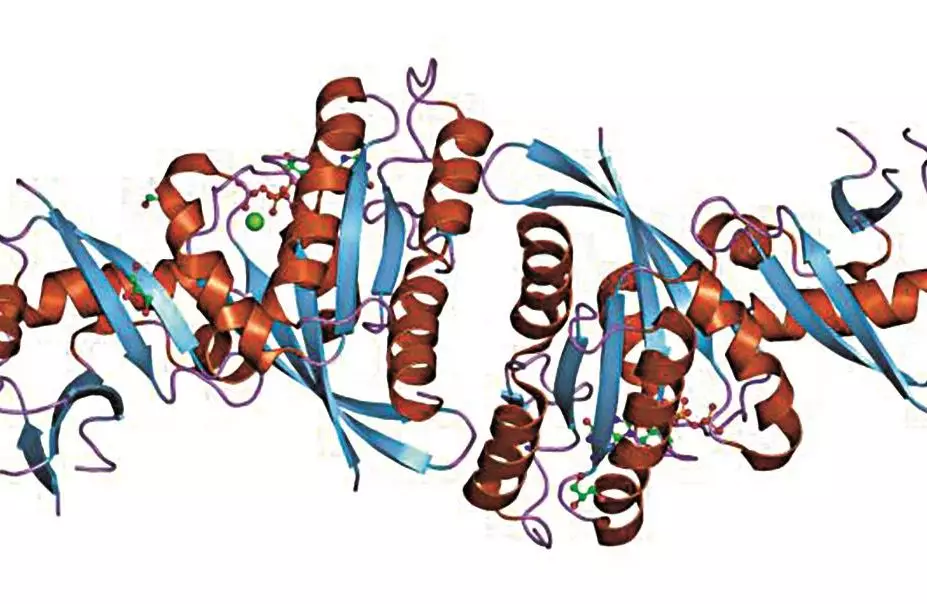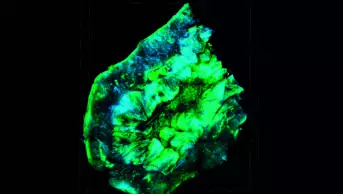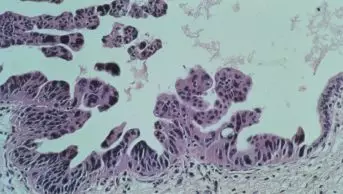
Wikimedia Commons
Researchers have identified an agent that interferes with the function of a cell signalling protein KRAS — a mutation in the KRAS gene is an essential step in the development of many cancers — to produce a dose-dependent reduction in tumour growth in a mouse model, according to a presentation at the National Cancer Research Institute conference on 5 November 2014 in Liverpool, UK[1]
.
KRAS, a GTPase and member of the RAS family of proteins, is synthesised in the cytoplasm and modified to enable the protein to associate with the plasma membrane. It acts as a molecular switch, translating growth factor-derived signals into cell growth and differentiation.
The protein undergoes a series of modifications, including the addition of a 15-carbon farnesyl lipid tail in a reaction catalysed by the farnesyltransferase enzyme. Faulty versions of Ras cause an over production of these signals, leading to cancer.
Attempts to develop farnesyltransferase inhibitors to prevent the addition of the lipid tail failed because KRAS could still associate with the plasma membrane through an unexpected compensatory mechanism. Instead, the farnesyltransferase-related enzyme geranylgeranyltransferase-I modifies RAS with a geranylgeranyl, rather than a farnesyl, group.
“We’ve been scratching our heads for decades to find a solution to one of the oldest conundrums in cancer research,” says Herbert Waldmann, one of the researchers at the Max Planck Institute of Molecular Physiology in Dormund, Germany. “And we’re excited to discover that it’s actually possible to completely bypass this cancer-causing protein rather than attack it directly.”
Previous work had found that suppression of the delta subunit of cGMP phosphodiesterase (PDEδ) disrupts RAS association with the plasma membrane and impairs the growth of RAS-mutant cancer cells[2]
, so the Max Planck researchers looked for molecules that could block PDEδ association with the farnesylated tail of KRAS. The most promising was deltarasin[3]
.
They validated deltarasin’s ability to block PDEδ–KRAS interaction in pancreatic cancer cell lines and, in a mouse model of pancreatic ductal adenocarcinoma, deltarasin produced a dose-dependent reduction in tumour growth.
“The challenge still lies in developing a treatment that exploits this discovery without ruining the workings of healthy cells,” says Waldmann.
Matt Seymour, UK clinical research director at the UK’s National Cancer Research Institute says that it is an exciting approach that could lead to a new way of treating cancer. But he adds: “The research is still at a very early stage and it will be years before it can benefit patients.”
References
[1] Waldmann H. Chemical biological modulation of Ras signalling. 2014 NCRI Cancer Conference. Liverpool. 2-5 November 2014.
[2] Chandra A, Grecco H E, Pisupati V, et al. The GDI-like solubilizing factor PDE-delta sustains the spatial organization and signalling of Ras family proteins. Nature Cell Biol. 2012;14:148–158. Note: Erratum: Nature Cell Biol. 2012;14:329.
[3] Zimmermann G, Papke P, Ismail S, et al. Small molecule inhibition of the KRAS–PDEδ interaction impairs oncogenic KRAS signalling. Nature 2013;497:638-642.


